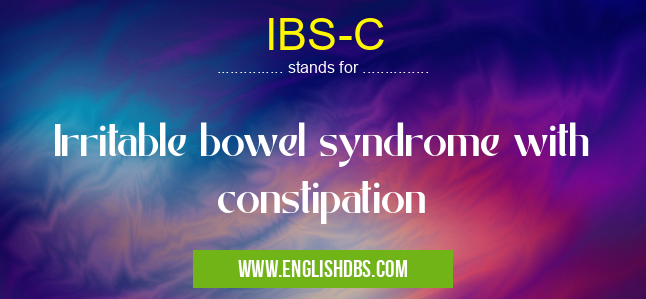What does IBS-C mean in PEDIATRIC
Irritable bowel syndrome with constipation (IBS-C) is a functional bowel disorder characterized by abdominal pain, bloating, and constipation. It is a common condition, affecting up to 15% of the population. IBS-C can significantly impact a person's quality of life, causing discomfort, embarrassment, and anxiety.

IBS-C meaning in Pediatric in Medical
IBS-C mostly used in an acronym Pediatric in Category Medical that means Irritable bowel syndrome with constipation
Shorthand: IBS-C,
Full Form: Irritable bowel syndrome with constipation
For more information of "Irritable bowel syndrome with constipation", see the section below.
Symptoms of IBS-C
- Abdominal pain and cramping
- Bloating and distension
- Constipation (infrequent or difficult bowel movements)
- Straining during bowel movements
- Hard, dry stools
- Feeling of incomplete evacuation
- Alternating periods of diarrhea and constipation
Causes of IBS-C
The exact cause of IBS-C is unknown, but it is believed to be related to a combination of factors, including:
- Gastrointestinal motility disorders: The muscles of the digestive tract may not be contracting properly, leading to slow transit of stool.
- Dietary triggers: Certain foods, such as FODMAPs (fermentable oligosaccharides, disaccharides, monosaccharides, and polyols), can trigger IBS symptoms.
- Hormonal changes: Women may experience IBS symptoms around the time of their menstrual cycle.
- Stress: Stress can worsen IBS symptoms in some individuals.
- Genetics: IBS-C may run in families, suggesting a genetic component.
Diagnosis of IBS-C
IBS-C is diagnosed based on the Rome IV criteria, which include:
- Recurrent abdominal pain for at least 6 months
- Abdominal pain relieved by defecation
- Change in bowel movement frequency (constipation)
- Changed stool form (hard, dry stools)
Treatment of IBS-C
There is no cure for IBS-C, but treatment can help manage symptoms. Treatments may include:
- Dietary modifications: Avoiding trigger foods, such as FODMAPs
- Medications: Laxatives, antispasmodics, and antidepressants
- Psychological therapies: Cognitive behavioral therapy and relaxation techniques
- Lifestyle changes: Exercise, stress management, and adequate sleep
Essential Questions and Answers on Irritable bowel syndrome with constipation in "MEDICAL»PEDIATRIC"
What is IBS-C?
Irritable bowel syndrome with constipation (IBS-C) is a common functional bowel disorder characterized by abdominal pain, cramping, and infrequent bowel movements.
What are the symptoms of IBS-C?
Common symptoms of IBS-C include:
- Abdominal pain and cramping relieved by bowel movements
- Hard or lumpy stools
- Straining during bowel movements
- Infrequent bowel movements (less than three per week)
- A feeling of incomplete evacuation after bowel movements
What causes IBS-C?
The exact cause of IBS-C is unknown, but it is thought to be related to a combination of factors, including:
- Altered bowel motility
- Increased intestinal sensitivity
- Dysregulated gut-brain axis
- Stress and anxiety
How is IBS-C diagnosed?
IBS-C is diagnosed based on a thorough medical history and physical examination. There is no specific test for IBS-C. Your healthcare provider may recommend additional tests, such as blood tests, stool tests, or imaging, to rule out other conditions.
What are the treatment options for IBS-C?
Treatment for IBS-C aims to relieve symptoms and improve bowel function. Common treatment options include:
- Lifestyle changes, such as dietary modifications and stress management
- Medications, such as laxatives, fiber supplements, and antispasmodics
- Cognitive behavioral therapy
- Hypnotherapy
Can IBS-C lead to serious complications?
While IBS-C is generally not life-threatening, it can significantly impact quality of life. In rare cases, IBS-C may be associated with an increased risk of colorectal cancer. However, regular screening and follow-up care can help reduce this risk.
Final Words: IBS-C is a common functional bowel disorder that can significantly impact a person's quality of life. While there is no cure, effective treatments exist to manage symptoms. Individuals experiencing IBS-C should seek medical advice for appropriate diagnosis and treatment options.
